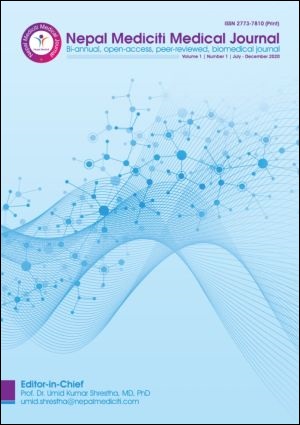Efficacy Of Three Different Regimens In Eradication Of Helicobacter Pylori Infection In Nepalese Patients Of Gandaki Region
DOI:
https://doi.org/10.3126/nmmj.v1i1.34469Keywords:
Antibiotics, eradication, Helicobacter pylori, rapid urease test, urea breadth testAbstract
Background: Helicobacter pylori (H. pylori) is associated with the pathogenicity of gastro-duodenal ulcers and gastric cancers. Combination of several antimicrobial therapies and regimens have been advised for H. pylori treatment. But, resistance to various antibiotics regimens are being documented worldwide. The present study was undertaken to study the efficacy of commonly used 3 different regimens for eradication of H.pylori infection in Nepalese patients.
Methods: A cross-sectional, hospital based study comprising of 405 subjects, was conducted. Each study patient underwent upper gastro-intestinal endoscopy followed by rapid urease test or histopathology from the biopsy sample for H. pylori detection. Patients were randomly subjected to 3 different H. pylori eradication regimen. After 4 weeks of therapy, patients were re-evaluated for persistence of H. pylori infection either by repeat UGI endoscopy followed by RUT or C14- Urea Breadth Test. Data analysis was done by SPSS 20.
Results: Mean age of the patients was 34.4±8.72 years (M: F=1.5:1) with male predominance. H. pylori eradication rate was only 65.9% in patients using standard triple regimen using Amoxicillin, Clarithromycin and PPI (Group A). Eradication rate was greater (77.8%) with Levofloxacin based regimen (Group B) and 83.3%. with sequential regimen containing Amoxicillin followed by Clarithromycin and Tinidazole with PPI (Group C).
Conclusion: The study demonstrates that the current standard Amoxicillin and Claritrhromycin based triple regimen has lowest eradication rate followed by levofloxacin based regimen. The sequential regimen was the most efficacious among the 3 different regimens for H. pylori eradication.
Downloads
Downloads
Published
How to Cite
Issue
Section
License
This license enables reusers to distribute, remix, adapt, and build upon the material in any medium or format, so long as attribution is given to the creator. The license allows for commercial use.

